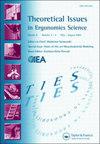Kansei engineering with online review mining methodology for robust service design
IF 1.4
Q4 ERGONOMICS
引用次数: 0
Abstract
AbstractKansei Engineering (KE) has shown its prominent applicability in service design and development, focusing on translating and interpreting customers’ emotional needs (Kansei) into service characteristics. It is critical and promising as the services sector has grown faster than the manufacturing sector in developing economies in the past three decades. It accounted for an average of 55% of GDP in some developing economies. KE’s flexibility in collaborating with other methods and covering various service settings shows its unique superiority. However, there is criticism of the collected Kansei’s validity and the proposed solution’s robustness. It might be potentially caused by the dynamics of customer emotional needs and various service settings. As a result, Kansei is found to be somewhat fuzzy, unclear, and ambiguous. Hence, a more structured KE methodology incorporating the Kansei text mining process for robust service design is proposed. Kansei text mining approach will extract and summarize service attributes and their corresponding affective responses based on the online product descriptions and customer reviews. The Taguchi method will support the robustness of the proposed improvement strategy. An empirical study of a zoo as a tourism attraction service and its practical implication is discussed and validated in the proposed integrative framework.Keywords: Kansei engineeringrobust designmining methodologyservice innovation Disclosure statementNo potential conflict of interest was reported by the author(s).Additional informationFundingThis study was supported by the Department of Industrial Engineering University of Surabaya and the research grant by the Ministry of Education, Culture, Research, and Technology Republic of Indonesia under a research scheme of Excellent Basic Research of Higher Education (PDUPT) with a contract number 003/SP2H/LT-MULTI-PDPK/LL7/2021.基于在线评论挖掘方法的感性工程稳健服务设计
摘要感性工学(KE)注重将顾客的情感需求(感性)转化为服务特征,在服务设计和开发中显示出突出的适用性。在过去30年里,发展中经济体的服务业增长速度快于制造业,因此这一点至关重要,也很有希望。在一些发展中经济体,它平均占GDP的55%。KE与其他方法合作的灵活性和覆盖各种服务设置显示了其独特的优势。然而,对收集的感性的有效性和提出的解决方案的鲁棒性也有批评。它可能是由顾客情感需求的动态变化和各种服务设置引起的。因此,感性被认为是有些模糊、不清楚和模棱两可的。因此,提出了一种更结构化的KE方法,该方法结合了用于健壮服务设计的感性文本挖掘过程。感性文本挖掘方法将基于在线产品描述和客户评论提取和总结服务属性及其相应的情感反应。田口方法将支持所提出的改进策略的鲁棒性。在本文提出的整合框架中,对动物园作为旅游吸引服务的实证研究及其实践意义进行了讨论和验证。关键词:感性工程稳健设计方法服务创新披露声明作者未报告潜在利益冲突。本研究由泗水大学工业工程系和印度尼西亚教育、文化、研究和技术共和国在高等教育优秀基础研究(PDUPT)研究计划下的研究资助,合同编号为003/SP2H/LT-MULTI-PDPK/LL7/2021。
本文章由计算机程序翻译,如有差异,请以英文原文为准。
求助全文
约1分钟内获得全文
求助全文

 求助内容:
求助内容: 应助结果提醒方式:
应助结果提醒方式:


